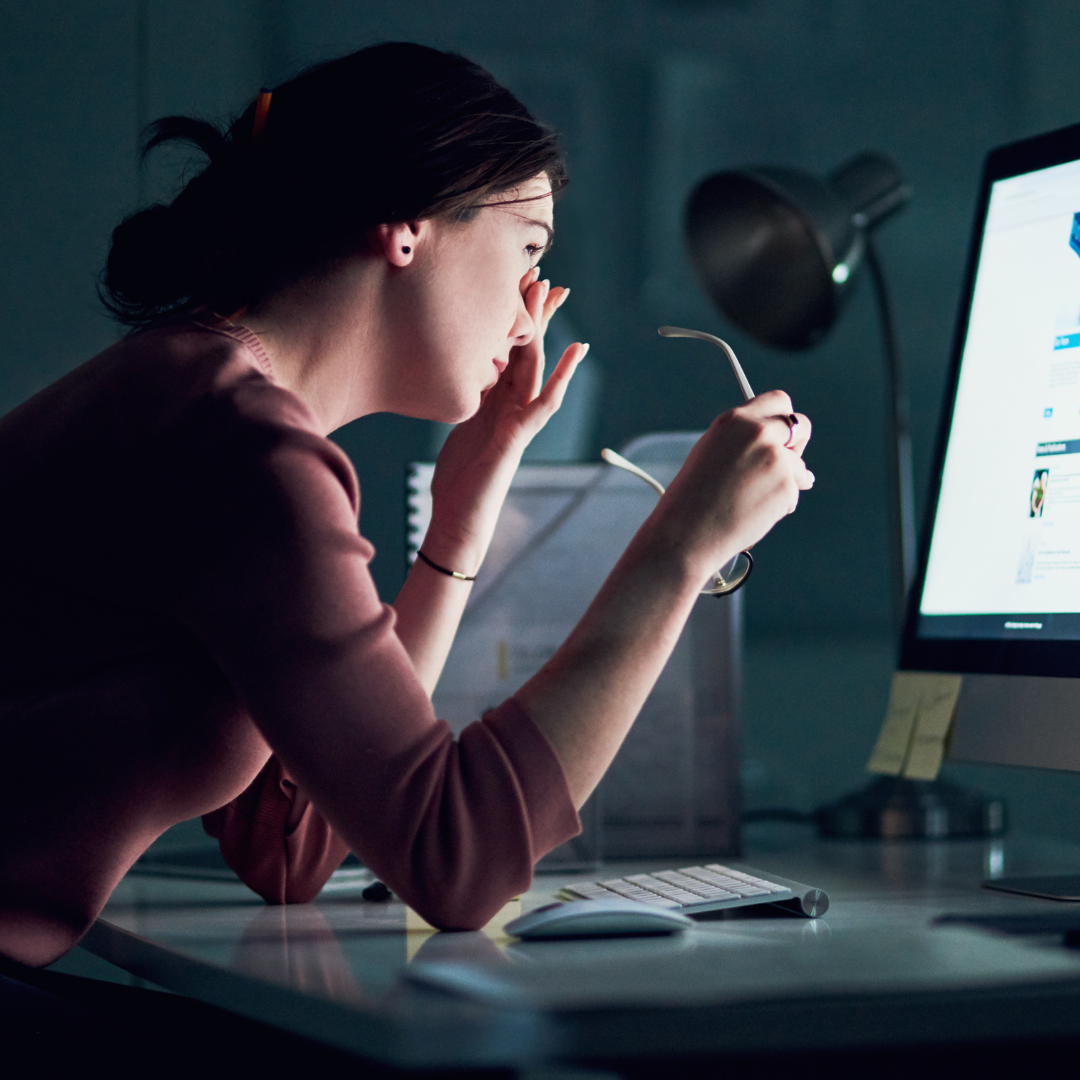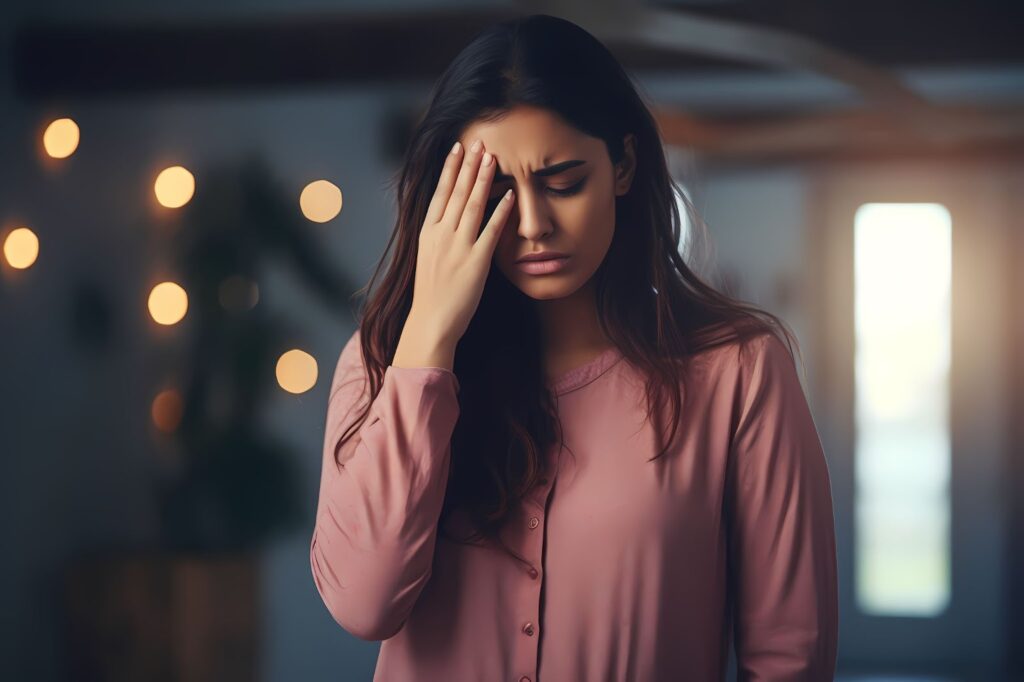The Everyday Battle with Eye Fatigue
You wake up, grab your phone, scroll through emails, then spend hours at work staring at a screen. By the end of the day, your eyes feel heavy, dry, and sore. Sound familiar? Eye fatigue is everywhere, hitting office workers, students, and even those who think they have a good routine. But what’s actually causing it, and more importantly, how do you fix it?
At LMC Optometry & Eye Care, we see eye strain complaints all the time. The good news? A few key changes can make all the difference. Let’s dive into the biggest culprits and how to get relief.
Why Are Your Eyes So Tired? The Biggest Causes of Eye Fatigue

1. Digital Overload—The Screen Time Struggle
Most of us spend hours glued to screens—whether it’s work, social media, or binge-watching Netflix. Staring at a screen reduces blinking, leading to dryness, irritation, and that burning sensation by evening. Blue light exposure also messes with your eye muscles, making them work harder than they should.
Solution: Follow the 20-20-20 rule—every 20 minutes, look at something 20 feet away for 20 seconds. Also, use blue light filters on your devices or invest in blue light glasses to ease strain.
2. Poor Lighting and Glare
Too bright? Too dim? Bad lighting strains your eyes in both cases. Overhead fluorescent lights, glare from windows, or even reading in bed with a tiny lamp can all contribute to eye fatigue.
Solution: Aim for soft, even lighting. If you work at a desk, an adjustable lamp with warm light is your best bet. Anti-glare screens can also help.
3. Dry Eye Syndrome—Not Enough Natural Moisture
If your eyes feel tired and scratchy, you might have dry eye syndrome. This happens when your tear glands don’t produce enough quality tears. Dry, windy weather in Ontario winters doesn’t help, either.
Solution: Artificial tears can bring quick relief, but long-term, it’s good to drink more water, use a humidifier, and blink more often (especially during screen time).
4. Uncorrected Vision Problems
If your prescription isn’t up-to-date, your eyes have to work overtime to compensate. That means more squinting, straining, and, you guessed it—fatigue. Even mild vision issues can lead to headaches and tired eyes by the end of the day.
Solution: Get an eye exam. If you haven’t had one in over a year, it’s time to check in. Your optometrist can spot changes in your vision before they start affecting your daily life.
5. Allergies and Environmental Irritants
Pollen, dust, smoke, or even strong perfumes can make your eyes red, itchy, and tired. If you’re prone to allergies, eye strain can be worse during peak allergy seasons.
Solution: Try allergy eye drops, keep windows closed during high pollen days, and avoid rubbing your eyes—it only makes things worse.
Who’s Most Affected by Eye Fatigue?
Some people are more prone to tired eyes than others. If you fit into any of these groups, you’ll want to be extra mindful of eye care:
- Office workers and students: Anyone staring at screens for long hours is at high risk.
- Drivers and pilots: Extended focus on the road or sky strains the eyes.
- People over 40: As we age, our eyes produce fewer tears, leading to more dryness and fatigue.
- Contact lens wearers: Lenses can dry out your eyes, making fatigue even worse.
How Long Does It Take to Recover from Eye Fatigue?
The good news? Mild eye fatigue usually improves within a few hours if you rest your eyes and hydrate. But if you’ve been straining your eyes for months, it can take weeks of better habits to feel a real difference. Ignoring it can lead to chronic discomfort and worsening vision over time.
Easy Fixes for Tired Eyes
If your eyes always feel tired, here’s how to get relief:
1. Blink More and Take Breaks
Sounds simple, but it works. Set a reminder to blink every few seconds and follow the 20-20-20 rule to give your eyes a break.
2. Adjust Your Screen Settings
Reduce blue light exposure by switching to night mode or using blue light glasses. Increase font size if you find yourself squinting.
3. Hydrate and Use Eye Drops
Dehydration makes dry eye worse. Drink plenty of water and keep preservative-free artificial tears on hand if your eyes feel dry.
4. Improve Your Workstation Setup
Position your screen at arm’s length and slightly below eye level. Make sure the lighting is even—no harsh glares or dim settings.
5. Get Regular Eye Checkups
Eye fatigue could be a sign of something more serious, like an undiagnosed vision problem. Booking an exam at LMC Optometry & Eye Care is a smart way to rule out any underlying issues.
Don’t Let Eye Fatigue Slow You Down
Tired eyes don’t have to be your new normal. With simple adjustments to your daily habits and environment, you can keep your eyes feeling fresh and focused. If fatigue persists or you’re overdue for an eye checkup, the team at LMC Optometry & Eye Care is here to help.
Schedule an appointment today—we’re committed to helping you see comfortably and clearly again.



